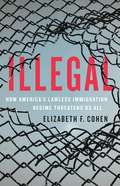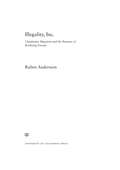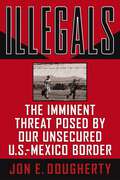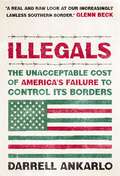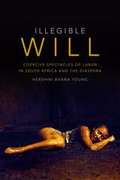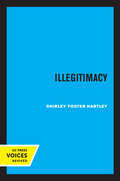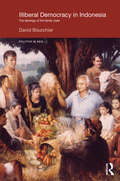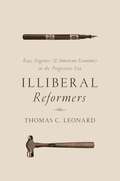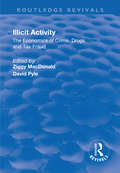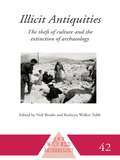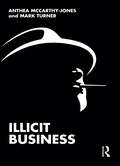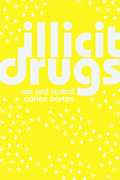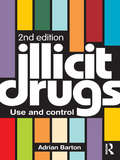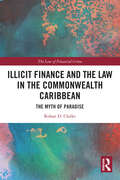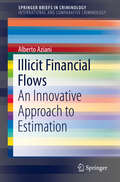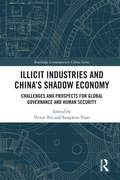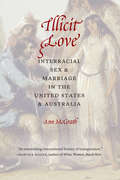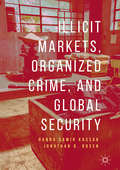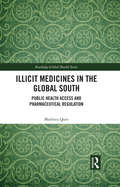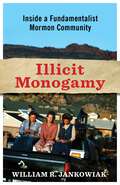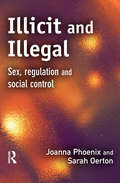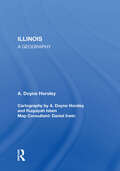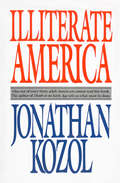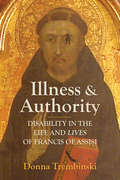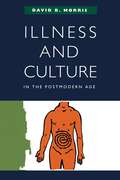- Table View
- List View
Illegal: How America's Lawless Immigration Regime Threatens Us All
by Elizabeth F. CohenA political scientist explains how the American immigration system ran off the rails -- and proposes a bold plan for reform Under the Trump administration, US immigration agencies terrorize the undocumented, target people who are here legally, and even threaten the constitutional rights of American citizens. How did we get to this point? In Illegal, Elizabeth F. Cohen reveals that our current crisis has roots in early twentieth century white nationalist politics, which began to reemerge in the 1980s. Since then, ICE and CBP have acquired bigger budgets and more power than any other law enforcement agency. Now, Trump has unleashed them. If we want to reverse the rising tide of abuse, Cohen argues that we must act quickly to rein in the powers of the current immigration regime and revive saner approaches based on existing law. Going beyond the headlines, Illegal makes clear that if we don't act now all of us, citizen and not, are at risk.
Illegality, Inc.
by Ruben AnderssonIn this groundbreaking ethnography, Ruben Andersson, a gifted anthropologist and journalist, travels along the clandestine migration trail from Senegal and Mali to the Spanish North African enclaves of Ceuta and Melilla. Through the voices of his informants, Andersson explores, viscerally and emphatically, how Europe's increasingly powerful border regime meets and interacts with its target-the clandestine migrant. This vivid, rich work examines the subterranean migration flow from Africa to Europe, and shifts the focus from the "illegal immigrants" themselves to the vast industry built around their movements. This fascinating and accessible book is a must-read for anyone interested in the politics of international migration and the changing texture of global culture.
Illegals: The Imminent Threat Posed by Our Unsecured U.S.-Mexico Border
by Jon DoughertyIn years past, immigration into the United States was treated as a privilege, not a right to be granted automatically just by being able to make it to America's shoreline or borders. Today, however, the entire process of immigration has been drastically politicized by both major parties in Washington, D.C.; one party sees votes - the other, cheap labor. This is investigative journalist Jon Dougherty's probing look into how this indiscriminate immigration is tearing at the fabric of our culture and society. Interviewing Border Patrol agents, local residents, citizen-enforcement groups and even the immigrants themselves, Dougherty examines the implicit dangers of our reckless attitude toward admittance, showing how all American citizens, native-born and otherwise, are consequently threatened by welfare fraud, drug lords, and terrorism. This is the untold, unnerving true story about the social and political turmoil on the U.S.-Mexico border.
Illegals: The Unacceptable Cost of America's Failure to Control Its Borders
by Darrell AnkarloAMERICA'S MELTING POT IS BOILING OVER.Millions of illegals strain an overburdened system. Crime ratesskyrocket. From the Valley of the Sun to the halls of Congress, debate rages. Allthe while, murder and mayhem reign along the U.S.-Mexico border. Speaking intothe fray at a timely juncture, radio talk-show host Darrell Ankarlo delivers agripping, beyond-the-headlines look at illegal immigration: its victims, itsperpetrators, and its toll on the heart of a nation and the will of herlaw-abiding citizens. From the hot-button state of Arizona, Ankarlo daredventure to the epicenter of the battle for America's southern border.Now he dares you to absorb the heartbreaking stories andeye-opening discoveries he brought back from his undercover journey without findingyourself shaken, inspired... and compelled to act.Endorsements:"Instead of complaining about the "border problem," DarrelAnkarlo set out to do something about it--he went there and lived it! InIllegals, Darrell provides a real and raw 'boots on the ground' look at ourincreasingly lawless southern border. This edition . . . will make you shakeyour head and say 'no way' as you're presented with true stories andexperiences about life along the border. This book will enlighten you and attimes frighten you, but in the end you'll know better than most politicianswhat's really happening at the border." --GLENN BECK
Illegible Will: Coercive Spectacles of Labor in South Africa and the Diaspora
by Hershini Bhana YoungIn Illegible Will Hershini Bhana Young engages with the archive of South African and black diasporic performance to examine the absence of black women's will from that archive. Young argues for that will's illegibility, given the paucity of materials outlining the agency of black historical subjects. Drawing on court documents, novels, photographs, historical records, websites, and descriptions of music and dance, Young shows how black will can be conjured through critical imaginings done in concert with historical research. She critically imagines the will of familiar subjects such as Sarah Baartman and that of obscure figures such as the eighteenth-century slave Tryntjie of Madagascar, who was executed in 1713 for attempting to poison her mistress. She also investigates the presence of will in contemporary expressive culture, such as the Miss Landmine Angola beauty pageant, placing it in the long genealogy of the freak show. In these capacious case studies Young situates South African performance within African diasporic circuits of meaning throughout Africa, North America, and South Asia, demonstrating how performative engagement with archival absence can locate that which was never recorded.
Illegitimacy
by Shirley F. HartleyThis title is part of UC Press's Voices Revived program, which commemorates University of California Press’s mission to seek out and cultivate the brightest minds and give them voice, reach, and impact. Drawing on a backlist dating to 1893, Voices Revived makes high-quality, peer-reviewed scholarship accessible once again using print-on-demand technology. This title was originally published in 1975.
Illiberal Democracy in Indonesia: The Ideology of the Family State (Politics in Asia)
by David BourchierIlliberal Democracy in Indonesia charts the origins and development of organicist ideologies in Indonesia from the early 20th century to the present. In doing so, it provides a background to the theories and ideology that informed organicist thought, traces key themes in Indonesian history, examines the Soeharto regime and his ‘New Order’ in detail, and looks at contemporary Indonesia to question the possibility of past ideologies making a resurgence in the country. Beginning with an exploration of the origins of the theory of the organic state in Europe, this book explores how this influenced many young Indonesian scholars and ‘secular’ nationalists. It also looks in detail at the case of Japan, and identifies the parallels between the process by which Japanese and Indonesian nationalist scholars drew on European romantic organicist ideas to forge ‘anti-Western’ national identities and ideologies. The book then turns to Indonesia’s tumultuous history from the revolution to 1965, the rise of Soeharto, and how his regime used organicist ideology, together with law and terror, to shape the political landscape consolidate control. In turn, it shows how the social and economic changes wrought by the government’s policies, such as the rise of a cosmopolitan middle class and a rapidly growing urban proletariat led to the failure of the corporatist political infrastructure and the eventual collapse of the New Order in 1998. Finally, the epilogue surveys the post Soeharto years to 2014, and how growing disquiet about the inability of the government to contain religious intolerance, violence and corruption, has led to an increased readiness to re-embrace not only more authoritarian styles of rule but also ideological formulas from the past. This book will be welcomed by students and scholars of Southeast Asia, politics and political theory, as well as by those interested in authoritarian regimes, democracy and human rights.
Illiberal Reformers: Race, Eugenics, and American Economics in the Progressive Era
by Thomas C. LeonardIn Illiberal Reformers, Thomas Leonard reexamines the economic progressives whose ideas and reform agenda underwrote the Progressive Era dismantling of laissez-faire and the creation of the regulatory welfare state, which, they believed, would humanize and rationalize industrial capitalism. But not for all. Academic social scientists such as Richard T. Ely, John R. Commons, and Edward A. Ross, together with their reform allies in social work, charity, journalism, and law, played a pivotal role in establishing minimum-wage and maximum-hours laws, workmen's compensation, progressive income taxes, antitrust regulation, and other hallmarks of the regulatory welfare state. But even as they offered uplift to some, economic progressives advocated exclusion for others, and did both in the name of progress. Leonard meticulously reconstructs the influence of Darwinism, racial science, and eugenics on scholars and activists of the late nineteenth and early twentieth centuries, revealing a reform community deeply ambivalent about America's poor. Economic progressives championed labor legislation because it would lift up the deserving poor while excluding immigrants, African Americans, women, and "mental defectives," whom they vilified as low-wage threats to the American workingman and to Anglo-Saxon race integrity. Economic progressives rejected property and contract rights as illegitimate barriers to needed reforms. But their disregard for civil liberties extended much further. Illiberal Reformers shows that the intellectual champions of the regulatory welfare state proposed using it not to help those they portrayed as hereditary inferiors, but to exclude them.
Illicit Activity: The Economics of Crime, Drugs and Tax Fraud (Routledge Revivals)
by Ziggy Macdonald David J PyleThis title was first published in 2000: A collection of research papers on the theme of illicit activity, all written by either members or associate members of the Public Sector Economics Research Centre in the Department of Economics at the University of Leicester. The work reported covers three areas of activity: crime (especially property-related crime); consumption of illegal substances (drugs); and income tax evasion.
Illicit Antiquities: The Theft of Culture and the Extinction of Archaeology (One World Archaeology #Vol. 42)
by Neil Brodie Kathryn Walker TubbThe exploitation of archaeological sites for commercial gain is a serious problem worldwide. In peace and during wartime archaeological sites and cultural institutions, both on land and underwater, are attacked and their contents robbed for sale on an international 'antiquities' market. Objects are excavated without record, smuggled across borders and sold for exorbitant prices in the salesrooms of Europe and North America. In some countries this looting has now reached such a scale as to threaten the very survival of their archaeological and cultural heritage. This volume highlights the deleterious effects of the trade on cultural heritage, but in particular it focuses upon questions of legal and local responses: How can people become involved in the preservation of their past and what, in economic terms, are the costs and benefits? Are international conventions or export restrictions effective in diminishing the volume of the trade and the scale of its associated destruction?
Illicit Business
by Mark Turner Anthea McCarthy-JonesIllicit business is big business. It covers a diverse range of activities from money laundering, drug trafficking and human trafficking through to the manufacture of counterfeit goods and the multiple activities in informal and shadow economies. This book introduces the world of illegal business.The authors contextualise the evolution in practices of illegal business around the world, highlighting the importance of organised crime, shadow economies, and informal sectors. Incorporating scholarly insights with real world examples, the book provides a much-needed business and economics analysis of a subject that is otherwise dominated by criminologists.With a range of case studies, this book provides a global approach that will be valuable reading for students seeking to understand the business of crime.
Illicit Drugs: Use and Control
by Adrian BartonIllicit drugs and their use are now, more than ever, a dominant concern of politicians, policy makers and the general public. Often, our understandings of the 'drug problem' tend to be uni-dimensional and based around particular areas of risk: drug related crime, dependency and ill-health. This book moves beyond this single issue approach and locates illicit drug use in its wider context, with chapters on: the history of illicit drug use measuring the 'problem' legal and medical responses to illicit drug use the illicit drugs market drugs, crime and trends in drug policy. Drawing information from wide-ranging sources, Adrian Barton illuminates the complex nature and broad impact illicit drug use carries in its wake and provides an overview of the contemporary state of the drug 'scene'. This book will be essential reading for students and researchers working in the area of drugs and society.
Illicit Drugs: Use and control
by Adrian BartonIllicit drugs and their use are a dominant concern of politicians, policy makers and the general public. As such, this second edition of the popular Illicit Drugs: Use and Control provides a timely, up-to-date discussion of the key issues raised in the first edition, whilst also providing new chapters which address: Class, gender and race The geo-politics of illicit drug production and distribution Britain’s drug use within a global context Drawing information from wide-ranging sources, Adrian Barton illuminates the complex nature and broad impact illicit drug use carries in its wake and provides an overview of the contemporary state of the drug 'scene'. This accessible book, with its inclusion of new pedagogical features, will be essential reading for students and researchers working in the area of drugs and society.
Illicit Finance and the Law in the Commonwealth Caribbean: The Myth of Paradise (The Law of Financial Crime)
by Rohan D. ClarkeThis book provokes fresh ways of thinking about small developing States within the transnational legal order for combating money laundering and the financing of terrorism and proliferation (TAMLO). From the global wars on drugs and terror to journalistic exposés such as the ‘Paradise’, ‘Panama’ and ‘Pandora’ Papers, the Commonwealth Caribbean has been discursively stigmatised as a mythical island paradise of ‘rogue’ States. Not infrequently, their exercise of regulatory self-determination has been presented as the selling of their economic sovereignty to facilitate shady business deals and illicit finance from high-net-worth individuals, kleptocrats, tax-dodgers, organised crime networks and terrorist financiers. This book challenges conventional wisdom that Commonwealth Caribbean States are among the ‘weakest links’ within the global ecosystem to counter illicit finance. It achieves this by unmasking latent interests, and problematising coercive extraterritorial regulatory and surveillance practices, along the onshore/offshore and Global North/South axes. Interdisciplinary in its outlook, the book will appeal to policymakers, regulatory and supervisory authorities, academics and students concerned with better understanding legal and development policy issues related to risk-based regulatory governance of illicit finance as well as those arising from money laundering related to corruption, politically exposed persons (PEPs), offshore finance and offshore Internet gambling services.
Illicit Financial Flows: An Innovative Approach to Estimation (SpringerBriefs in Criminology)
by Alberto AzianiIllicit Financial Flows (IFFs) have received increased attention in light of international corruption scandals, high-profile leaks about extensive tax abuse schemes, and the continued fight against terrorism financing and organized crime. Reducing IFFs is now a key target of the UN Sustainable Development Goals, renewing debates about both how to operationally define IFF and the methodologies that are used to estimate their extent.This book addresses these key issues, by investigating and schematizing the concept of illicit financial flows and critically evaluating the current models used to estimate them. It book proposes an original flow-network approach through which to produce longitudinal and country-specific estimates of IFFs and the gross value added related to transnational trafficking. It advocates for a reformulation of the current definition of IFFs to one that is more specific and operational, allowing scholars and policy-makers to better clarify the relationship between IFFs, the sources of capital and the channels that are used to move capital abroad. This brief will be an indispensable guide for students of criminology and organized crime, and for the researchers and practitioners working to understand and combat these crimes.
Illicit Industries and China’s Shadow Economy: Challenges and Prospects for Global Governance and Human Security (Routledge Contemporary China Series)
by Victor Teo Sungwon YoonThis book considers a wide range of illicit industries in China, exploring what drives such activities, why consumers tolerate them to differing degrees, how attempts to regulate them are implemented and how such regulation is resisted. Industries considered include human smuggling, human organs trade, illicit pharmaceuticals, smuggling of animal parts, illegal logging and trade of woods, food safety and shadow banking. Throughout, the book describes how the shadow economy works, analyses the degree to which illicit activities are regarded as criminal and highlights the importance of the shadow economy for certain regions of China and certain sections of Chinese society. In doing so, it reveals the challenges of human security posed by these industries not only for China, but also for the global community, and considers a robust governance mechanism at both national and global levels to address these challenges. Overall, the book provides a very rich picture of a key aspect of China’s contemporary economy which is difficult to research.
Illicit Love: Interracial Sex and Marriage in the United States and Australia (Borderlands and Transcultural Studies)
by Ann McGrathIllicit Love is a history of love, sex, and marriage between Indigenous peoples and settler citizens at the heart of two settler colonial nations, the United States and Australia. Award-winning historian Ann McGrath illuminates interracial relationships from the late eighteenth to the early twentieth century through stories of romance, courtship, and marriage between Indigenous peoples and colonizers in times of nation formation.The romantic relationships of well-known and ordinary interracial couples provide the backdrop against which McGrath discloses the “marital middle ground” that emerged as a primary threat to European colonial and racial supremacy in the Atlantic and Pacific Worlds from the Age of Revolution to the Progressive Era. These relationships include the controversial courtship between white, Connecticut-born Harriett Gold and southern Cherokee Elias Boudinot; the Australian missionary Ernest Gribble and his efforts to socially segregate the settler and aboriginal population, only to be overcome by his romantic impulses for an aboriginal woman, Jeannie; the irony of Cherokee leader John Ross’s marriage to a white woman, Mary Brian Stapler, despite his opposition to interracial marriages in the Cherokee Nation; and the efforts among ordinary people in the imperial borderlands of both the United States and Australia to circumvent laws barring interracial love, sex, and marriage.Illicit Love reveals how marriage itself was used by disparate parties for both empowerment and disempowerment and came to embody the contradictions of imperialism. A tour de force of settler colonial history, McGrath’s study demonstrates vividly how interracial relationships between Indigenous and colonizing peoples were more frequent and threatening to nation-states in the Atlantic and Pacific worlds than historians have previously acknowledged.
Illicit Markets, Organized Crime, and Global Security
by Jonathan D. Rosen Hanna Samir KassabThis book explains the existence of illicit markets throughout human history and provides recommendations to governments. Organized criminal networks increased in strength after the enforcement of prohibition, eventually challenging the authority of the state and its institutions through corruption and violence. Criminal networks now organize under cyber-infrastructure, what we call the Deep or Dark Web. The authors analyze how illicit markets come together, issues of destabilization and international security, the effect of legitimate enterprises crowded out of developing countries, and ultimately, illicit markets' cost to human life.
Illicit Medicines in the Global South: Public Health Access and Pharmaceutical Regulation (Routledge Global Health Series)
by Mathieu QuetThis book investigates pharmaceutical regulation and the public health issue of fake or illicit medicines in developing countries. The book analyses the evolution of pharmaceutical capitalism, showing how the entanglement of market and health interests has come to shape global regulation. Drawing on extensive fieldwork in India, Kenya and Europe, it demonstrates how large pharmaceutical companies have used the fight against fake medicines to serve their strategic interests and protect their monopolies, sometimes to the detriment of access to medicines in developing countries. The book investigates how the contemporary dynamics of pharmaceutical power in global markets have gone on to shape societies locally, resulting in more security-oriented policies. These processes highlight the key consequences of contemporary "logistical regimes" for access to health. Providing important insights on how the flows of commodities, persons, and knowledge shape contemporary access to medicines in the developing countries, this book will be of considerable interest to policy makers and regulators, and to scholars and students across sociology, science and technology studies, global health, and development studies.
Illicit Monogamy: Inside a Fundamentalist Mormon Community
by William JankowiakAngel Park is a Mormon fundamentalist polygamous community where plural marriages between one man and multiple women are common. In contrast to mainstream America’s idealization of the nuclear family and romantic love, its residents esteem notions of harmonious familial love, a spiritual bond that unites all family members. In their view, polygyny is not only righteous and sanctified—it is also conducive to communal life and social stability.Based on many years of in-depth ethnographic research in Angel Park, this book explores daily life in a polygamous community. William R. Jankowiak considers the plural family from the points of view of husbands, wives, and children, giving a balanced account of its complications and conflicts. He finds that people in polygynous marriages, especially cowives, experience an ongoing struggle to balance the longing for romantic intimacy with the obligation to support the larger family. They feel tension between deeply held religious convictions and the desire for emotional exclusivity, which can threaten the stability and harmony of the polygamous family. Men and women often form exclusive romantic pairs within plural marriages, which are tolerated if not openly acknowledged, showing the limits of the community’s beliefs. Jankowiak also challenges stereotypes of polygamous families as bastions of patriarchal power, showing the weight that interpersonal and social expectations place on men.Offering an unparalleled look at the complexity of a polygamous religious community, Illicit Monogamy also helps us reconsider relationships, love, and family dynamics across cultures and settings.
Illicit and Illegal
by Joanna Phoenix Sarah OertonThis book is about the surprisingly neglected area of the regulation of sex. It describes and discusses the ways in which various sexual activities are controlled, regulated and made illegal and/or deviant and illicit. Its primary focus is upon the multiple and complex social controls (laws, statutory regulations, professional/occupational codes, normative frameworks) constructing, constituting and shaping how we 'do' sex, and deals with sex that is both illicit (deviant, illegal) and illegal (criminal, offending). The book challenges the idea that early twenty-first century Britain is increasingly sexually 'liberated' by suggesting that this very 'openness' provides the conditions in which all sexual activities have become increasingly subject to regulation and control. By examining the policies and laws about various sexually activities, and the social conditions underpinning them, alongside existing research and theoretical literature the authors have provided an accessible text on the sociology of sex.
Illinois: A Geography
by A. Doyne HorsleyHorsley focuses on the contrasting environments within the state of Illinois and on the interactions of the inhabitants with their surroundings. He uses a standard Progressing from the physical and historical factors, through economic activities, concluding with chapters on Chicago and its suburbs. The text includes an urban-rural traverse across the state and a series of maps on presidential voting records by counties, 1960 to 1984.
Illiterate America
by Jonathan Kozol"Kozol. . . has assembled facts, rebuttals, and proposals-in an emotionally potent, ethically charged package. "-Kirkus.
Illness and Authority: Disability in the Life and Lives of Francis of Assisi
by Donna TrembinskiIllness and Authority examines the lived experience and early stories about St. Francis of Assisi through the lens of disability studies. This new approach re-centres Francis’s illnesses and infirmities and highlights how they became barriers to wielding traditional modes of masculine authority within both the Franciscan Order he founded and the church hierarchy. So concerned were members of the Franciscan leadership that the future saint was compelled to seek out medical treatment and spent the last two years of his life in the nearly constant care of doctors. Unlike other studies of Francis’s ailments, Illness and Authority focuses on the impact of his illnesses on his autonomy and secular power, rather than his spiritual authority. From downplaying the comfort Francis received from music to disappearing doctors in the narratives of his life, early biographers worked to minimize the realities of his infirmities. When they could not do so, they turned the saint’s experiences into teachable moments that demonstrated his saintly and steadfast devotion and his trust in God. Illness and Authority explores the struggles that early authors of Francis’s vitae experienced as they tried to make sense of a saint whose life did not fit the traditional rhythms of a founder-saint.
Illness and Culture in the Postmodern Age
by David B. MorrisWe become ill in ways our parents and grandparents did not, with diseases unheard of and treatments undreamed of by them. Illness has changed in the postmodern era—roughly the period since World War II—as dramatically as technology, transportation, and the texture of everyday life. Exploring these changes, David B. Morris tells the fascinating story, or stories, of what goes into making the postmodern experience of illness different, perhaps unique. Even as he decries the overuse and misuse of the term "postmodern," Morris shows how brightly ideas of illness, health, and postmodernism illuminate one another in late-twentieth-century culture.Modern medicine traditionally separates disease—an objectively verified disorder—from illness—a patient's subjective experience. Postmodern medicine, Morris says, can make no such clean distinction; instead, it demands a biocultural model, situating illness at the crossroads of biology and culture. Maladies such as chronic fatigue syndrome and post-traumatic stress disorder signal our awareness that there are biocultural ways of being sick.The biocultural vision of illness not only blurs old boundaries but also offers a new and infinitely promising arena for investigating both biology and culture. In many ways Illness and Culture in the Postmodern Age leads us to understand our experience of the world differently.
